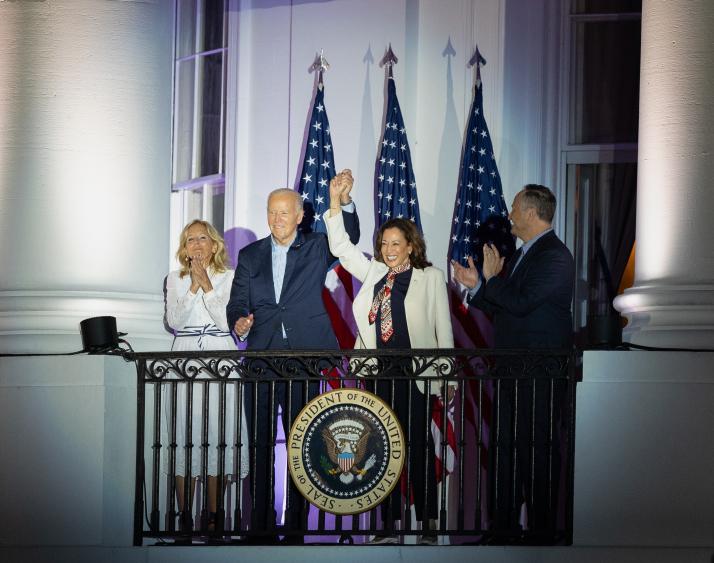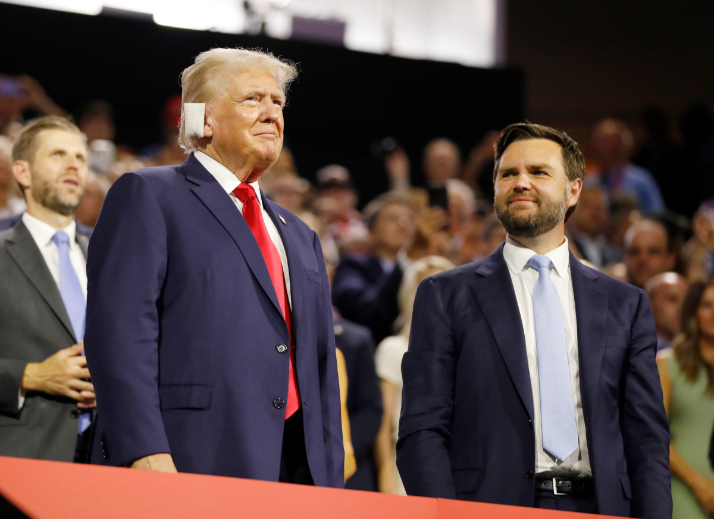| World |
| How Chinese people view the ongoing U.S. presidential race | |
|
|
 U.S. President Joe Biden and Vice President Kamala Harris watch the Independence Day fireworks display at the White House in Washington, D.C., the United States, on July 4 (XINHUA)
The United States presidential election, held every four years, captures global attention. Earlier this year, nations were evaluating the potential outcomes of former President Donald Trump returning to the White House versus the reelection of President Joe Biden. The first presidential debate in June gave Trump a boost in morale, especially after Biden struggled during the debate. Then came July, upending everything. Halfway through the month, Trump narrowly survived an assassination attempt, while Biden suddenly withdrew from the race, passing the torch to current Vice President Kamala Harris, who quickly gained a marginal lead over Trump in the polls. With both parties finalizing their tickets—J.D. Vance as the Republican running mate and Tim Walz for the Democrats—the race is now in full swing. The relationship between China and the U.S. is one of the most critical bilateral relations in the world. How would the victory of each candidate affect this relationship, and does China favor Trump or Harris? Data from Chinese tech giant Baidu may reflect the focus of Chinese netizens on the U.S. election, while academic perspectives might offer a different view. Online buzz Baidu, currently the leading online search engine in China, commands over 60 percent of the Chinese search market. According to the global data platform Statista.com, hundreds of millions of users worldwide make over 5 billion queries on Baidu daily. The company has developed a tool called the Baidu Index, which tracks and analyzes online search trends. This tool is useful for monitoring online behavior related to the U.S. presidential election and understanding the interests and questions of Chinese netizens about this event. The Baidu Index comprises three components: trends, tracking the popularity of specific keywords over a specified time; top 10 related tags and most changed tags, updated weekly, indicating the most popular and rapidly changing search terms related to the keywords; and demographic insight, which breaks down keyword searches by different age groups, genders and regions within China, with monthly updates. From July 1 to 31, Internet users from different Chinese provincial-level regions displayed varying levels of interest in the U.S. presidential election. The highest number of searches for the keywords "U.S. presidential election," "Trump," "Biden" and "Harris" came from Guangdong Province in south China, followed by Jiangsu Province, Zhejiang Province, Shandong Province and Beijing Municipality—all economically advanced regions. During this period, the age group most engaged in these searches was between 20 and 40 years old. In contrast, users born after 2005, showed the least interest, while those over 40 displayed a declining trend in interest. When examining gender differences, male users far outnumbered their female counterparts. Extending the analysis back to January of this year reveals more insights. The search volume for the competition between Biden and Trump remained consistently low and stable, with searches hovering around a few thousand, according to the Baidu Index. However, following the events in mid-July, searches for the keyword "Trump" skyrocketed by 6,200 percent, reaching 350,000 on July 15. Meanwhile, searches for "Harris," who had previously maintained a low profile, surged by 20,850 percent to 270,000 on July 22. During the week of July 15 to July 21, the search term related to "Trump" that saw the highest rate of change was "Trump's response to the shooting." While Chinese netizens are relatively familiar with Trump, their curiosity about "Harris" focused more on understanding who she is, with half of the top 10 search terms centered around this question. Additionally, there was substantial interest in her political positions, particularly concerning China-U.S. relations, as the third most searched term was "Harris's stance on China after being elected."  Former U.S. President Donald Trump and Ohio Senator J.D. Vance attend the Republican National Convention in Milwaukee, Wisconsin, on July 15. At the convention, Trump, who was formally nominated as the Republican Party's presidential nominee, announced he had chosen Vance as his running mate (XINHUA)
Other search terms revealed a more lighthearted interest among Chinese Internet users, who were curious about Harris's personal life, including her marriage and what she looked like when she was younger. By August, interest in the U.S. election among Chinese Internet users had returned to lower, more stable levels. Despite the Democratic National Convention starting on August 19, featuring influential Democratic figures, the keyword "Democratic National Convention" did not appear in Baidu's index, and related searches for "Democratic Party" remained below 1,000. Strategic views For the Chinese Government, academia and those involved in China-U.S. relations, the perspective is somewhat different. China's guiding principle in its foreign policy is based on mutual respect for sovereignty, core interests and the choice of social systems and development paths. This principle underpins state-to-state relations and dictates that China does not interfere in internal affairs of other countries or impose its will on others, just as it does not allow outside forces to interfere in its own internal affairs. Chinese Foreign Ministry spokespersons have repeatedly stated that China has no comment on the U.S. presidential elections, whether or not it concerns the Trump-Vance or Harris-Walz tickets, as these are U.S. domestic matters. An article in U.S. publication Foreign Affairs on August 1, titled Does China Prefer Harris or Trump?, noted that the first Trump administration had adopted a more confrontational approach to relations with Beijing by labeling China a strategic competitor and even a "threat," moving away from treating it as a trading partner. Despite some changes in tone, the Biden administration has reinforced and even escalated this stance on certain issues. According to the article, co-authored by Wang Jisi, founding President of the Institute of International and Strategic Studies at Peking University, and research associates Hu Ran and Zhao Jianwei, there is a bipartisan consensus in Washington that China should now be treated as a major adversary. During a speech at the 11th World Peace Forum in Beijing in early July, Wu Xinbo, Dean of the Institute of International Studies at Fudan University, said the China-U.S. relationship still "lacks reciprocity and is uneven." He emphasized that issues such as the Taiwan question, sanctions and tariffs, have seen little progress, as the Biden administration has been reluctant to address China's concerns. The Foreign Affairs article pointed out that Chinese strategists have few illusions that U.S. policy toward China might change over the next decade. Given U.S. public opinion and the bipartisan consensus on China in Washington, they expect that whoever wins this November's election will continue to prioritize strategic competition and possibly containment in Washington's approach to Beijing. Both candidates, as potential presidents, present challenges and disadvantages for China, and neither is expected to seek major military conflict or completely sever economic and societal ties. Therefore, Beijing is unlikely to have a clear preference, the article suggested. Moreover, China has strong incentives to maintain a stable relationship with the U.S. and to avoid confrontation or major disruptions, the article added. (Print Edition Title: Gazing Across the Pacific) Copyedited by Elsbeth van Paridon Comments to liwenhan@cicgamericas.com |
|
||||||||||||||||||||||||||||||
|